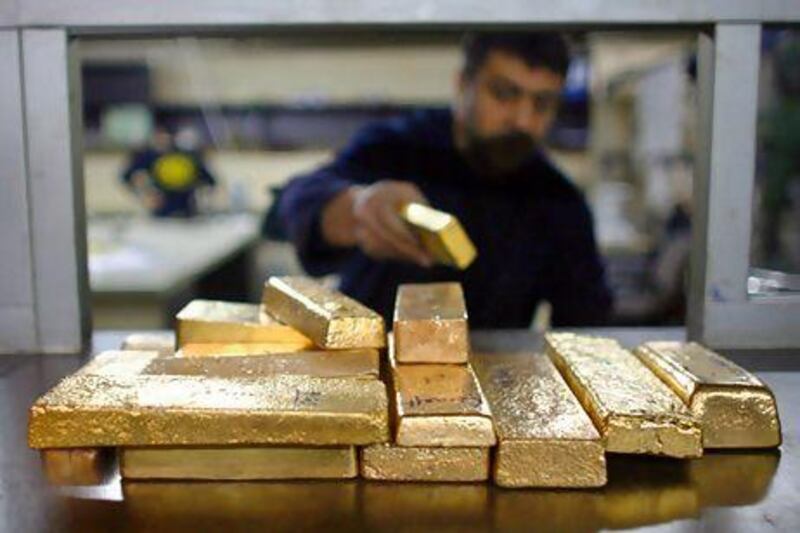Barack Obama, the United States president, likes to be seen to talk turkey. But the one he is set to talk about soon will be listening intently.
A decision is expected from Mr Obama on whether or not he will veto more stringent sanctions against Iran, now the US senate has passed a measure targeting loopholes in gold exports to the country.
If he agrees with policymakers, that could put a major dent in Turkey's finances. The country's gold trade with neighbouring Iran has helped shrink its trade deficit over the past year, with precious metals accounting for about half of the almost US$21 billion (Dh77.13bn) decline.
"The current account is being flattered a bit at the moment by gold sales and a tightening of sanctions would probably see the current account deficit push higher," Timothy Ash, the head of emerging-market research at Standard Bank in London, said yesterday.
"Recent data has still suggested the underlying rebalancing is stronger than previously thought."
Still, the shrinking deficit has calmed investor concern over the country's current-account gap and helped persuade Fitch Ratings to give Turkey its first investment grade rating since 1994.
The country exported $11.9bn of gold in the first 10 months of the year, according to the country's statistics agency's website. Eighty-five per cent of the shipments went to Iran and the UAE.
Turkey's current-account deficit narrowed for the 12th straight month in October as slowing economic growth curbed demand for imported goods and gold sales to Iran and the UAE boosted exports.
The gap shrank to $2bn from $4.5bn a year earlier, the central bank in Ankara said. It was forecast at $2 billion according to the median estimate of 11 economists surveyed by Bloomberg. Turkey's current-account deficit has dropped to about a fifth of the March last year high of $9.5bn. As shipments of precious metals abroad slow and the central bank seeks to spur growth, the narrowing of the gap may soon bottom out, or reverse, analysts said.
"I think the narrowing trend in the current account deficit has come, or is coming to an end," says Inan Demir, the chief economist at Finansbank in Istanbul. "I would be much more confident of this in the absence of the gold exports."
The US senate voted last month to approve new sanctions against Iran, closing gaps from previous measures, including trade in precious metals. Mr Obama, who opposes the move on the grounds it may undercut existing efforts to rein in the rogue nation's nuclear ambitions, signed an executive order in July restricting gold payments to Iranian state institutions.
Iran is buying the gold with payments Turkey makes for natural gas it purchases in liras, Ali Babacan, the Turkish deputy prime minister, told a parliamentary committee in Ankara last month.
Iran provides Turkey with between 21 per cent and 25 per cent of its gas.
But the effect of Turkey's gold shipments on its current-account deficit has been exaggerated, said Tevfik Aksoy, the chief economist for central and eastern Europe, the Middle East and Africa at Morgan Stanley in London.
"The successful engineering of the soft landing and the rebalancing in the economy resulted in a significant adjustment in the current account," he said recently.
"We would consider any attribution of the rebalancing to gold exports as very unfair."
The current-account deficit may fall to $57.3bn by year-end, according to a regular survey of economists by the central bank published last week. That compares with $77.1bn last year, when Turkey had the second-biggest deficit in the world, behind the US. Turkey's economy grew at a pace of 1.6 per cent in the third quarter, according to figures released on Monday.
Its inflation rate declined to 6.4 per cent last month, the lowest in 14 months, freeing Erdem Basci, the central bank governor, to reduce his benchmark 5.75 per cent interest rate. Inflation was 10.5 per cent at the end of last year. Mr Basci last cut his benchmark policy rate to 5.75 per cent in August last year, extending a boom in lending that helped swell the current-account deficit to about 10 per cent of GDP by year-end.
Turkey's almost $800bn economy will probably slow to about 3 per cent growth this year, according to Bloomberg. That compares with an 8.5 per cent expansion last year. This means the country is likely to continue shrinking its deficit "even without gold," says Haluk Burumcek, the chief economist at EFG Istanbul Securities. "Due to slowing growth, Turkey will import less."
The trade with Iran is a strategic necessity for Turkey and the government will view any new US sanctions according to its own interests, Recep Tayyip Erdogan, the prime minister, said in Istanbul.
The gold debate poses a dilemma for Turkey and the nation's finances may be pinched by the outcome, said Nilufer Sezgin, the chief economist at Erste Securities in Istanbul.
"The sustainability of gold exports will very much depend on the sanctions. If gold exports stop completely, the current account deficit will start to deteriorate."
* with agencies





